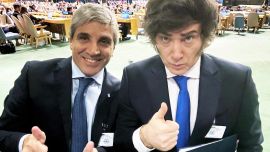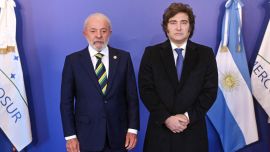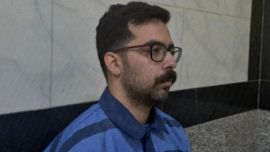Since Wednesday, Ecuador has been in a “state of war” against drug-cartels who have launched a blood-ridden campaign of terror against the government.
Gangs have incited a brutal spree of attacks in response to President Daniel Noboa’s recent crackdown measures, and the government has deployed more than 22,400 soldiers to suppress the violence.
The crisis erupted after José Adolfo Macias, the leader of Ecuador's largest drug gang, Los Choneros, escaped from prison. From his jail cell in the port city of Guayaquil, Macias has continued his criminal operation for 12 years.
According to rights groups, cartel power is possible in institutions like Ecuador’s overcrowded prisons because of corruption and lack of state control.
In response to Macias’ escape, the national government declared an “armed conflict” measure on Monday that allows the total mobilisation of the military throughout national territory, and the police have reported episodes of violence since.
After President Noboa imposed the state of emergency, the gangs declared "war,” threatening to execute civilians and prison workers. Cartels have also set off explosives in public spaces and launched attacks, in which at least 16 people have been killed.
Prison riots erupted in multiple locations after the announcement. According to the SNAI prison authority, 178 guards and administrators have been taken hostage and 16 people have been killed, as of Thursday.
On Tuesday, shortly after the riots began, men wearing balaclavas stormed a state-owned television station Guayaquil during a live broadcast. With guns and explosives, they forced crew members to the ground and firing shots. Police arrived 30 minutes into the attack.
Thirteen assailants were arrested, many of them young teenagers.
Now, streets are largely deserted apart from military deployment. Hundreds of soldiers are on patrol in Quito, the capital, where residents are gripped by fear over the violence, which has also prompted alarm abroad. Public transportation is reduced, businesses are shuttered, schools and universities are closed and many are working from home.
Border fears
Since the attacks, Peru has declared a state of emergency and sent 500 additional soldiers to its border with Ecuador. Columbia’s Army also announced that it is increasing border security. France and Russia have advised citizens not to travel to Ecuador, and China’s Embassy has halted services to the public.
When the 36-year-old Noboa took office in November, he pledged to “relentlessly confront” the transnational cartels that use Ecuador’s ports to ship cocaine to the United States and Europe.
The small South American country borders two of the largest cocaine producers in the world, Columbia and Peru, which has attracted foreign mafia from Columbia, Mexico and Europe to ally, and fight, with local Ecuadorean gangs over drug routes.
Since February 2021, most violence related to drug gangs has occurred in prisons, where fights between inmates have resulted in more than 400 dead. Ecuador’s homicide rate has also quadrupled since 2018, with 2023 marking the worst rates thus far. A record of 220 tons of drugs were also seized in 2023.
It is estimated that in the country of about 17 million people, cartels have more than 20,000 members.
During his time in office, Noboa has targeted 22 criminal groups, including Los Choneros, Los Lobos and Tiguerones. Los Lobos leader Fabricio Colón Pico also escaped from an Ecuadorian prison, following his arrest last Friday for alleged involvement in a plot to assassinate former presidential candidate and attorney general Fernando Villavicencio.
Noboa has vowed not to back down in the face of recent attacks and violence. On Wednesday, he told Radio Canela that Ecuador is "in a state of war, and we cannot give in to these terrorist groups."
The president has issued orders to “neutralise” the criminal groups responsible and has continued to deploy security forces since Tuesday.
Mondino ‘socialist’ controversy
Argentina’s new Foreign Minister Diana Mondino received strong pushback from opposition critics this week after she posted a controversial message in support of the Ecuadorean government.
President Javier Milei’s top diplomat wrote on X (formerly Twitter) that she offered Argentina’s “full support for… the action of the security forces against the attempted coup of narco-terrorist socialist groups” in Ecuador.
Critics mocked her for attempting to score ideological points with the post.
The drug-cartels in Ecuador are not socialist.
– TIMES/AFP


























Comments